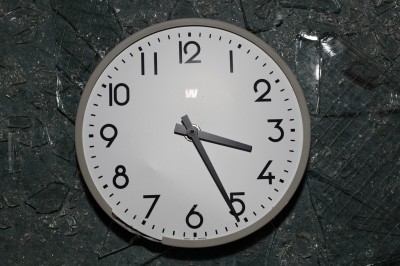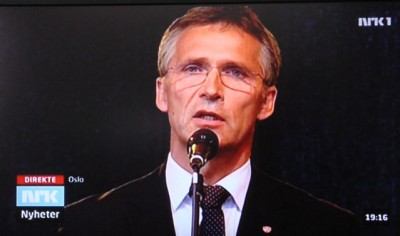NEWS ANALYSIS: Sunday marked 100 days since Norway was attacked by a home-grown, right-wing extremist at 3:25 on the afternoon of July 22nd. The trauma after the terror he unleashed lingers among survivors, rescue personnel, government officials and many others, who now dread all the memories his trial will dredge up.

Norwegian media have been full of ongoing coverage of the aftermath of the attacks, much of it now aimed at the investigations going on into them and preparation for the trial of confessed terrorist Anders Behring Breivik. It’s expected to begin right after Easter and may be wrapped up before summer holidays begin in late June.
Many of those who directly experienced Breivik’s bombing of government headquarters in Oslo and his subsequent massacre on the island of Utøya are still struggling to get their lives back on track. Extensive counseling and other support services help, but survivors report nightmares, concentration problems, and flashbacks when they hear sudden noises or sirens, for example. Even those with extensive training in crisis situations, like the Norwegian People’s Aid workers who happened to be on the island that fateful afternoon and shielded many from being shot, are experiencing post-traumatic stress.
“We can seem OK on the outside, be we have scars that aren’t visible for others,” Guttorm Skovly of the humanitarian group told newspaper Aftenposten. He and his wife Elin, from the Norwegian People’s Aid (Norsk Folkehjelp) office in Hadeland, helped save more than 40 young summer campers on the island by barricading themselves inside a building and keeping the gunman out. They’d seen him slaughter other members of the Labour Party’s youth organization, and also had some wounded in their group.
Now they need to be getting help instead of giving it, and it’s an unusual situation. “I still feel the fear, and have become very jumpy,” said one of their colleagues, Wenche Holmen.

They’re far from alone. While many try to get with their lives, even some of the most determined survivors admit to feeling traumatized, and some have felt it necessary to take a long break from their jobs or school. Also top public officials, like Oslo Mayor Fabian Stang, have had to make extra efforts to get back to business as usual. “We must live on with these scars,” Stang told the local weekly Ditt Oslo last week. “Among the most important things we can do is to follow up everyone.” He sees an enormous need to aid those affected and also be on the lookout for young persons “who need extra support or attention,” to prevent any similar attacks in the future.
Information continues to emerge about the attacks, with Breivik’s defense attorney Geir Lippestad saying last week that his client chose July 22 because he knew that former Prime Minister Gro Harlem Brundtland, who went on to head the UN’s World Health Organisation, would be visiting Labour’s summer camp on the island that day. She was not his main target, though, according to both Lippestad and police. Rather, it was the Labour Party itself and the government Labour leads.
Lippestad is busy preparing his defense of Norway’s most notorious criminal ever, and is likely to focus on a lack of security measures in both Oslo and on Utøya. Last week Lippestad and his team visited the farm where Breivik made his bomb, and he’s aware the trial will be difficult for survivors. Still, he says, he has a job to do.

Security is already being heightened, with streets around government offices including the Foreign Ministry in Oslo now being blocked off to traffic, and a major joint military and police anti-terror exercise due to be carried out this week, using sites in northern Norway. There’s been harsh criticism of the police in the wake of the attacks, and a special state commission claims it will examine all aspects of the emergency response to the attacks. Prime Minister Jens Stoltenberg has promised an “honest and unadorned” report on the roles of the police, the military and government response.
Some of the criticism has caused more trauma, with young Labour members trying to fend off questions over how some of them on the island reacted to the massacre, and whether they ran off instead of helping others. A decision by Labour’s youth organization AUF to restrict media access to the island “is deeply problematic,” wrote commentator Irene Halvorsen in newspaper Dagsavisen last week. The state commission’s work, she added, will be part of Norway’s history. “That’s not owned by AUF, even though they own the island,” she admonished.
The Norwegian media itself is constantly being put the test, having to balance consideration for victims and survivors with the public’s right to know. Dozens of survivors have complained bitterly about having to see Breivik’s picture in the media, and all the constant reminders of the terror they went through. They also had to see columns published by other right-wing activists, some of whom have supported parts of Breivik’s ideology, because of other criticism that the media had wrongly suppressed coverage of their views. As Halvorsen wrote, “The media can’t meet all needs, and also carry out its obligations.”
It remains unclear whether there will continue to be spikes in media coverage in connection with the four-month, five-month or half-year anniversaries of the attacks. One thing is certain: Norway will never forget what happened on July 22, and is slowly learning how to live with it.
Views and News from Norway/Nina Berglund
Please support our stories by clicking on the “Donate” button now:

